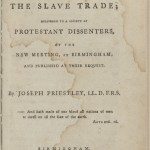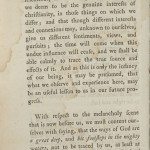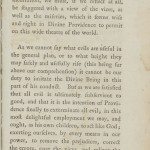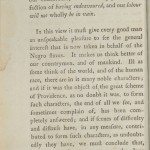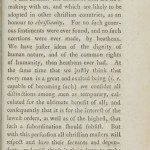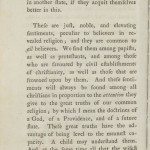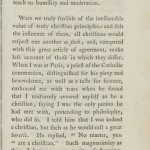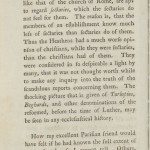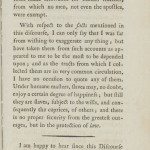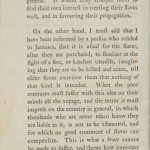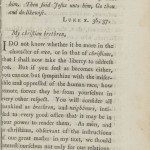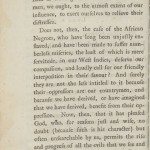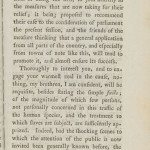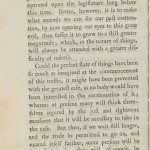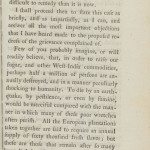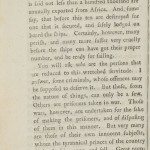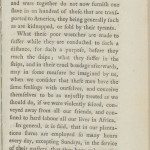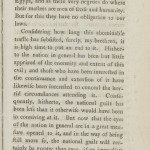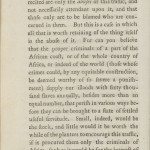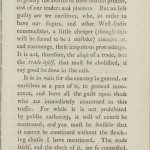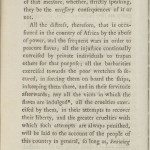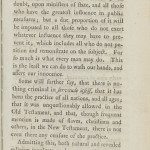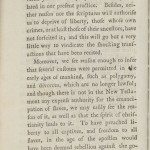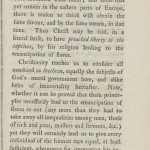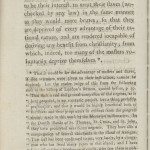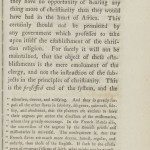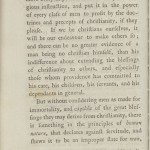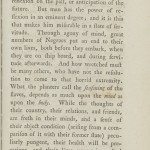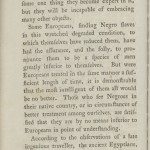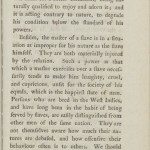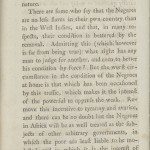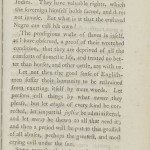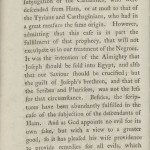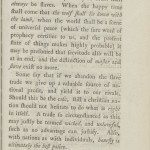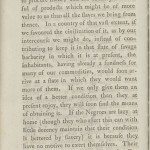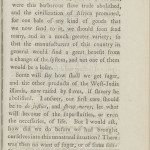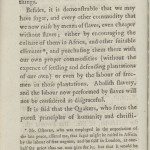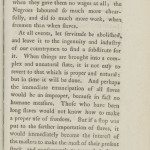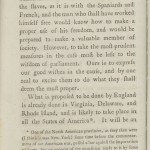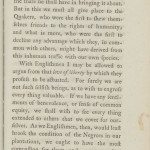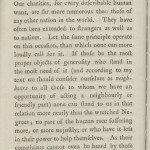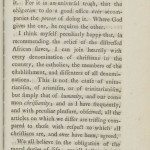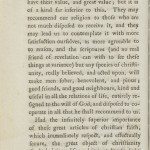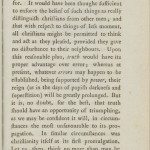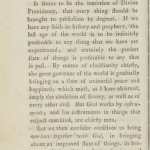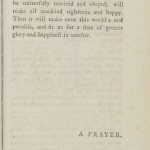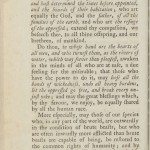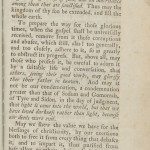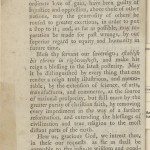Sermon on the Slave Trade by Dr Joseph Priestley
A SERMON on the subject of THE SLAVE TRADE; delivered to a society of PROTESTANT DISSENTERS, at the NEW MEETING in BIRMINGHAM; and published at their request.
By JOSEPH PRIESTLEY, LL.D. F.R.S.
– And hath made of one blood all nations of men to dwell on the face of the earth. ACTS xvii. 26.
Birmingham.
Printed for the author, by Pearson and Rollason;
And sold by J. Johnson, No. 72, St. Paul’s Churchyard, London.
MDCCLXXXVII
[PRICE ONE SHILLING]
——
THE PREFACE.
I publish this discourse not only in compliance with the request of a society of christians whom I think myself happy in every opportunity of obliging, but also because I thought that some of the arguments on which I have insisted had not been sufficiently urged by other writers on the same subject, and at the same time to evince my readiness to join with christians of all denominations in what appears to me to be right and just.
With the greatest satisfaction should I always go with the multitude, if a regard to the sacred rights of truth did not, on some occasions, forbid it. Happy it is, however, that there are some cases in which almost all who are truly conscientious, and who feel the influence of humane and christian sentiments, will concur. May this beget a persuasion, that we may be equally conscientious, and moved by a regard to what we deem to be the genuine interests of christianity, in those things on which we differ; and that though different interests and connexions may, unknown to ourselves, gives us different sentiments, views, and pursuits; the time will come when this undue influence will cease, and we shall be able calmly to trace the true source and effects of it. And as this is only the infancy of our being, it may be presumed, that what we observe and experience here, may be an useful lesson to us in our future progress.
With respect to the melancholy scene that is now before us, we must content ourselves with saying, that the ways of God are a great deep, and his footsteps in the mighty waters, not to be traced by us, at least at present. But we are sufficiently authorized to add, that though clouds and darkness are round about him, righteousness and judgement are ever the habitation of his throne. Unless this maxim be deeply impressed upon our minds, and made familiar to us by frequent meditation, we must, if we reflect at all, be staggered with a view of the vices, as well as the miseries, which it seems wise and right in Divine Providence to permit on this wide theatre of the world.
As we cannot say what evils are useful in the general plan, or to what height they may safely and usefully rise (this being far above our comprehension) it cannot be our duty to imitate the Divine Being in this part of his conduct. But as we are satisfied that all evil is ultimately subservient to good, and that it is the intention of Providence finally to exterminate all evil, in this most delightful employment we may, and ought, as his own children, to act like God; exerting ourselves, by every means in our power, to remove the prejudices, correct the errors, cure the vices, and relieve the distresses, of our fellow creatures. In exertions of this kind, our motives are pure, pious, and benevolent. We feel as we are conscious we ought to do; and with whatever success it may please God to crown our endeavours, we shall enjoy the satisfaction of having endeavoured, and our labour will not wholly be in vain.
In this view it must give every good man an unspeakable pleasure to see the general interest that is now taken in behalf of the Negro slaves. It makes us think better of our countrymen, and of mankind. Ill as some think of the world, and of the human race, there are in it many noble characters; and if it was the object of the great scheme of Providence, as no doubt it was, to form such characters, the end of all we see, and sometimes complain of, has been completely answered; and if scenes of difficulty and distress have, in any measure, contributed to form such characters, as undoubtedly they have, we must conclude that, shocking as they appear to us, they have not been introduced into the system in vain.
Looking at the tree, we may think it ill-shaped and disgusting; but considering the fruit, we must approve and admire it.
I also consider the exertions that are now making with us, and which are likely to be adopted in other christian countries, as an honour to christianity. For no such generous sentiments were ever found, and no such exertions were ever made, buy heathens. We have juster ideas of the dignity of human nature, and of the common rights of humanity, than heathens ever had. At the same time that we justly think that every man is a great and exalted being (ie. capable of becoming such) we consider all distinctions among men as temporary, calculated for the ultimate benefit of all; and consequently that it is for the interest of the lowest orders, as well as of the highest, that such a subordination should subsist. But with this persuasion all christian masters will respect and love their servants and dependants, and will think it their duty to make their situation as easy and happy as possible; considering them as brothers, and equals, in one and that the most important sense, while they treat them as inferiors in another; and as those who will even rank above them in another state, if they acquit themselves better in this.
These are just, noble, and elevating sentiments, peculiar to believers in revealed religion; and they are common to all believers. We find them among papists, as well as protestants, and among those who are favoured by civil establishments of christianity, as well as those that are frowned upon by them. And these sentiments will always be found among all christians in proportion to the attention they give to the great truths of our common religion; by which I mean the doctrines of a God, of a Providence, and of a future state. These great truths have the advantage of being level to the meanest capacity. A child may understand them. And, at the same time all that with the wisest among us can attain to farther, adds but little to their practical influence. Let these considerations teach the different sects of christians mutual candour, as reflections on the difference of ranks among men should teach us humility and moderation.
Were we truly sensible of the inestimable value of truly christian principles, and felt the influence of them, all christians would respect one another as such; and, compared with this great article of agreement, make less account of those in which they differ. When I was at Paris, a priest of the Catholic communion, distinguished for his piety and benevolence, as well as a taste for science, embraced me with tears when he found that I uniformly avowed myself to be a christian; saying I was the only person he had met with, pretending to philosophy, who did so. I told him that I was indeed a christian, but such as he would call a great heretic. He replied, “No matter, you are a christian”. Such magnanimity as this, I have no opportunity of showing, and might not be capable of. For no man can answer for his own feelings and conduct in new situations. There is a degree of abhorrence and contempt, with which the members of great and old establishments, like that of the church of Rome, are apt to regard sectaries, which the sectaries do not feel for them. The reason is, that the members of an establishment know much less of sectaries than sectaries do of them. Thus the Heathens had a much worse opinion of christians, while they were sectaries, than the christians had of them. They were considered in so despicable a light by many, that it was not thought worth while to make any inquiry into the truth of the scandalous reports concerning them. The shocking picture that is given of Turlupins, Beghards, and other denominations of the reformed, before the time of Luther, may be seen in any ecclesiastical history.
How my excellent Parisian friend would have felt if he had known the full extent of my present heresy I cannot tell. Others, however, of his communion are well apprized of it, without thinking the worse of me, in a moral respect, on that account. Of such men as these christianity may justly make her boast. In all, however, we must make allowance for human frailties, from which no men, not even the apostles, were exempt.
With respect to the facts mentioned in this discourse, I can only say that I was far from wishing to exaggerate any thing; but have taken them from such accounts as appeared to me to be the most to be depended upon; and as the tracts from which I collected them are in very common circulation. I have no occasion to quote any of them. Under humane masters, slaves may, no doubt, enjoy a certain degree of happiness; but still they are slaves, subject to the wills, and consequently the caprices, of others; and there is no proper security from the greatest outrages, but in the protection of law.
I am happy to hear since this Discourse was sent to the press, that one planter, who employs a very great number of slaves, has had no occasion to purchase any fresh ones these twenty years. This may convince us that a stoppage of the importation would not be a great hardship upon the planters in general. It would only compel them to find their own interest in treating their slaves well, and in favouring their propagation.
On the other hand, I must add that I have been informed by a person who resided in Jamaica, that it is usual for the slaves, after they are purchased, to shudder at the sight of a fire, or kitchen utensils, imagining that they are to be killed and eaten, till older slaves convince them that nothing of that kind is intended. What the poor creatures must suffer with this idea on their minds all the voyage, and the terror it must impress on the country in general, in which thousands who are never taken know they are liable to it, is not to be estimated, and for which no good treatment of slaves can compensate. This is what a brute cannot be made to suffer, and shows how improper and unnatural this trafficking with the human species must be Which of these three, thinkest thou, was neighbour to him that fell among the thieves? And he said, he that showed mercy unto him. Then said Jesus unto him, Go thou and do likewise. Luke X. 36, 37.
My christian brethren,
I do not know whether it be more in the character of men, or in that of christians, that I shall now take the liberty to address you. But if you feel as becomes either, you cannot but sympathize with the miserable and oppressed of the human race, how remote so ever they be from yourselves in every other respect. You will consider all mankind as brethren and neighbours, intitled to every good office that it may be in your power to render them. As men, and as christians, observant of the instructions, of our great master in my text, we should interest ourselves not only for our relations, and particular friends; not only for our countrymen; not only for Europeans, but for the distressed inhabitants of Asia, Africa, or America; and not only for christians, but for Jews, Mahometans, and Infidels. And as we ought to feel for our fellow men, we ought, to the utmost extent of our influence, to exert ourselves to relieve their distresses.
Does not, then, the case of the African Negroes, who have long been unjustly enslaved, and have been made to suffer numberless miseries, the least of which is mere servitude, in our West Indies, deserve our compassion, and loudly call for our friendly interposition in their favour? And surely they are not the less intitled to it because their oppressors are our countrymen, and because we have derived, or have imagined that we have derived, benefit from their oppression. Now, then, that it has pleased God, who, for reasons just and wise, no doubt (because such is his character) but often unsearchable by us, permits the rise and progress of all the evils that we see and lament has awakened the attention of many in our nation to this great and growing enormity, and to interest great numbers in favour of the unhappy sufferers, let not us be the last, though we cannot have the honour of being the first, to join heartily in the measures that are now taking for their relief; it being proposed to recommend their case to the consideration of parliament the present session, and the friends of the measure thinking that a general application from all parts of the country, and especially from towns of note like this, will tend to promote it, and almost ensure its success.
Thoroughly to interest you, and to engage your warmest zeal in the cause, nothing, my brethren, I am confident, will be requisite, besides stating the simple facts; of the magnitude of which few persons, not personally concerned in this traffic of the human species, and the treatment to which slaves are subject, are sufficiently apprized. Indeed, had the shocking scenes to which the attention of the public is now invited been generally known before, the evil could not have grown to its present height, or have existed so long as it has done. The feelings of every man would have revolted at it, and the sense of the nation (expressed, as it would have been, by petitions, and remonstrances) would have operated upon the legislature long before this time. Better, however, it is to make what amends we can for our past inattention, by now opening our eyes to this great evil, than suffer it to grow to a still greater magnitude; which, in the nature of things, will always be attended with a greater difficulty of redress.
Could the present state of things have been so much as imagined at the commencement of this traffic, it might have been prevented with the greatest ease, as no body would have been interested in the continuation of it; whereas at present many will think themselves injured by the just and righteous measures that it will be necessary to take in the case. But then, if we wait still longer, and the trade be permitted to go on, and extend itself farther, more persons will be interested in it; they will of course be able to make a greater opposition to the measure; and thus the evil, though greater, and more justly complained of, will be more difficult to remedy than it is now.
I shall proceed then to state this case as briefly, and as impartially, as I can, and answer all the most important objections that I have heard made to the proposed redress of the grievance complained of.
Few of you probably imagine, or will readily believe, that in order to raise our sugar and other West-India commodities, perhaps half a million of persons are annually destroyed, and in a manner peculiarly shocking to humanity. To die by an earthquake, by pestilence, or even by famine, would be merciful compared with the manner in which many of these poor wretches often perish. All the European plantations taken together are said to require an annual supply of sixty thousand fresh slaves; but these are those that remain after so many have died in what is called the seasoning, before they can be brought to bear the labour to which they are made to submit; and after so many more have been lost during the voyage, owing to the mode of their confinement, and ill usage on board, that it is said not less than a hundred thousand are annually exported from Africa. And, some say, that before this ten are destroyed for one that is secured, and safely lodged on board the ships. Certainly, however, many perish, and many more suffer very cruelly before the ships can have got their proper number, and be ready for sailing.
You will ask who are the persons that are reduced to this wretched servitude. I answer, some criminal, whose offences may be supposed to deserve it. But these, from the nature of things, can only be a few. Others are prisoners taken in war. Those wars, however, are undertaken for the sake of making the prisoners, and of disposing of them in this manner. But very many are those of their own innocent subjects, whom the tyrannical princes of the country violently seize upon, and sell. Great numbers also are continually kidnapped by any that can surprise and overpower them. And
these scenes of horror extend a thousand miles within land, for a vast extent of sea coast. It is said by some, that crimes and wars together do not now furnish one slave in an hundred of those that are transported to America, they being generally such as are kidnapped, or sold by their tyrants.
What these poor wretches are made to suffer while they are conducted to such a distance, for such a purpose, before they reach the ships; what they suffer in the ships, and in their cruel bondage afterwards, may in some measure be imagined by us, when we consider that these men have the same feelings with ourselves, and conceive themselves to be as unjustly treated as we should do, if we were violently seized, conveyed away from all our friends, and confined to hard labour all our lives in Africa.
In general, it is said, that in our plantations slaves are employed so many hours every day, excepting Sundays, in the service of their masters, that they have only one for themselves, and but little for sleep. For remissness in labour they are severely beaten, and for rebellion (as any attempt to recover their liberty is called) they are generally gibetted alive. The shocking indecencies to which the females are subjected during the voyage, and afterwards, and the cruel separation of the nearest relations and friends, husbands and wives, parents and children, both when they are put on board the ships, and at the place of sale, would be heard with horror by all but those who are habituated to this traffic.
This business was begun by the Portuguese, but the English entered into it so early as the year 1551, though contrary to the express orders of queen Elizabeth; and no Europeans whatever use their slaves with so much cruelty as the English. The Spaniards have made excellent regulations in their favour, in consequence of which the slaves can work out their own freedom; and the French government has also interposed by a code of laws enacted for this very purpose. But the slaves belonging to the English are almost wholly left to the mercy of their masters; and the annual consumption of them is itself a proof of the most cruel usage. For with good treatment even slaves will increase, as the Israelites did in Egypt, and as these very negroes do where their masters are men of sense and humanity. But for this they have no obligation to our laws.
Considering how long this abominable traffic has subsisted, surely, my brethren, it is high time to put an end to it. Hither to the nation in general has been but little apprized of the enormity and extent of this evil; and those who have been interested in the continuance and extension of it have likewise been interested to conceal the horrid circumstances attending it. Consequently, hitherto, the national guilt has been less that it otherwise would have been in conniving at it. But now that the eyes of the nation in general are in a great measure opened to it, and in the way of being still more so, the national guilt will certainly be greater than ever, if an immediate stop be not put to a species of iniquity which calls so loud for the vengeance of heaven.
It may be said that the particulars I have recited are only the abuses of this traffic, and not necessarily attendant upon it, and that those only are to be blamed who are concerned in them. But this is a case in which all that is worth retaining of the thing itself is the abuse of it. For can you believe that the proper criminals of a part of the African coast, or of the whole country of Africa, or indeed of the world (those whose crimes could, by any equitable construction, be deemed worthy of so severe a punishment) supply our islands with sixty thousand slaves annually, besides more than an equal number, that perish in various ways before they can be brought to a state of settled useful servitude. Small, indeed, would be the stock, and little would it be worth the while of the planter to encourage this traffic, if it procured them only the criminals of Africa, such as it would be for the interest of that country to have banished from it. And all the rest are innocent men, women, and children, unjustly deprived of their liberty, and condemned to the most cruel bondage, to gratify the avarice of their brutish princes, and of our traders and planters. But no less guilty are we ourselves, who, in order to have our sugars and other West-India commodities, a little cheaper (though this will be found to be a mistake) connive at, and encourage, these iniquitous proceedings. It is not, therefore, the abuse of a trade, but the trade itself, that must be abolished, if any good be done in the case.
It is in vain for the country in general, or ourselves as a part of it, to pretend innocence, and leave all the guilt upon those who are immediately concerned in this traffic. For while it is not prohibited by public authority, it will of course be continued; and you must be sensible that it cannot be continued without the shocking abuses I have mentioned. The trade itself, and the abuse of it, are so connected, that to authorize the one is to authorize the other also. And it is an universal maxim, that he who makes himself responsible for any measure whatever, is responsible for all that he believes will be the actual consequences of that measure, whether, strictly speaking, they be the necessary consequences of it or not.
All the distress, therefore, that is occasioned in the country of Africa by the abuse of power, and the frequent wars in order to procure slaves; all the injustice continually exercised by private individuals to trapan others for that purpose; all the barbarities exercised towards the poor wretches so secured, in forcing them on board the ships, in keeping them there, and in their servitude afterwards; nay all the vices in which the slaves are indulged*, all the cruelties exercised by them, in their attempts to recover their liberty, and the greater cruelties with which such attempts are always punished, will be laid to the account of the people of this country in general, so long as, knowing
* see a note in the excellent sermon preached before the society for the propagation of the gospel in foreign parts by the present Bishop of London, p.11, small edition this to be the actual state of things, we suffer it to proceed. Both the guilt of the oppressors, and the misery of the oppressed, will be equally laid at our door.
This guilt will lie the heaviest, no doubt, upon ministers of state, and all those who have the greatest influence in public measures; but a due proportion of it will be imputed to all those who do not exert whatever influences they may have to prevent it; which includes all who do not petition and remonstrate on the subject. For so much is what every man may do. This is the least we can do to wash our hands, and assert our innocence.
Some will farther say, that there is nothing criminal in servitude itself, that it has been the practice of all nations, and all ages; that it was unquestionably allowed in the Old Testament, and that, though frequent mention is made of slaves, christians and others, in the New Testament, there is not even there any censure of the practice.
Admitting this, both natural and revealed religion inculcate and humane and equitable treatment of all that come under our power. We are still under obligation to do to others as we would that they should do to us, in the same circumstances. And this rule of universal justice and equity is shamefully violated in our present practice. Besides, neither reason nor the scriptures will authorise us to deprive of liberty, those whose own crimes, or at least those of their ancestors, have not forfeited it; and this will go but a very little way to vindicate the shocking transactions that have been recited.
Moreover, we see reason enough to infer that several customs were permitted in the early ages of mankind, such as polygamy, and divorces, which are no longer lawful; and though there is not in the New Testament any express authority for the emancipation of slaves, we may easily see the reason of it, as well as that the spirit of christianity leads to it. To have preached liberty to all captives, and freedom to all slaves, in the age of the apostles would have been deemed rebellion against the government then established. We see however, that the sentiments of christianity, where they have spread, have actually operated to the emancipation of slaves in a very great part of the western world, which once abounded with them; and those that yet remain in the eastern parts of Europe, there is reason to think will obtain the same favour and by the same means, in due time. Thus Christ may be said, in a literal sense, to have preached liberty to the captives, by his religion leading to the emancipation of slaves.
Christianity teaches us to consider all mankind as brethren, equally the subjects of God’s moral government here, and alike heirs of immortality hereafter. Now, whether it can be proved that these principles necessarily lead to the emancipation of slaves or not (any more than they lead to take away all inequalities among men, those of rich and poor, masters and servants, &c.) yet they will certainly lead us to give every individual of the human race equal, at least sufficient, advantages for improving his nature, and preparing for a future state.
In this most important respect the poor and the rich, the master and the servant, may be equal. But alas! not so the slave in the West-Indies. It is the interest of the masters, at least they too generally imagine it to be their interest, to treat their slaves (unchecked by any law) in the same manner as they would mere brutes; so that they are deprived of every advantage of their rational nature, and are rendered incapable of deriving any benefit from christianity; from which, indeed, too many of the masters voluntarily deprive themselves*.
* That it would be for the advantage of masters and slaves, if due attention were given to their instruction, cannot be doubted. Let the reader judge of this from the following note to the Bishop of London’s sermon, quoted before, p. 20. “That such a real and general conversion of the negroes, as is here proposed, is no romantic project, but a thing perfectly practicable; and that it would be highly beneficial both to the slaves and their proprietors is evident from the progress already made in this work by the Moravian missionaries. In the Danish islands of St. Thomas, St. Croix, and St. John, they have proselyted near 6,000 negroes. They have also a congregation of several thousands in the island of Antigua. This fact has been confirmed to me, very lately, by a clergyman who has lived many years in that island; and I have been assured by a gentleman of credit, who saw them at public worship, that their deportment was remarkably serious, of some masters better things may no doubt with truth be said; but in general, I believe it is true of the slaves in the possession of the English, that they have no opportunity of hearing anything more of christianity than they would have had in the heart of Africa. This certainly should not be permitted by any government which professes to take upon itself the establishment of the christian religion. For surely it will not be maintained, that the object of these establishments is the mere emolument of the clergy, and not the instruction of the subjects in the principles of christianity. This is the professed end of the system, and the attentive, devout and edifying. And they so greatly surpass all the other slaves in sobriety, diligence, quietness, fidelity, and obedience, that the planters are anxious to have their negroes put under the direction of the missionaries, whom they greatly encourage. In the French islands also, the conversion of the negroes by the Romish priests and missionaries is universal. The consequence is, that the French slaves are much more decent, honest, regular, and orderly, than those of the English. If such be the effects even of erroneous systems of faith, what might not be expected from the doctrines of the church of England, inculcated with equal zeal? provision that is made for the clergy is only a means to that end*.
But whether government directly interfere in this business or not, it ought to remove every impediment in the way of religious instruction, and put it in the power of every class of men to profit by the doctrines and precepts of christianity, if they please. If we be christians ourselves, it will be our endeavour to make others so; and there can be no greater evidence of a man being no christian himself, than his indifference about extending the blessings of christianity to others, and especially those whom providence has committed to his care, his children, his servants, and his dependants in general.
But without considering men as made for immortality, and capable of the great blessings they may derive from christianity, there is something in the principles of human nature, that declares against servitude, and shows it to be an improper state for man,
* As the West India islands are, I believe, within the diocese of London, should not the bishops of that see have given particular attention to these poor souls under their care though not for brute beasts. These are capable of being happy in a state of servitude, some of them more so than in a state of liberty. The reason is that they have little reflexion on the past, or anticipation of the future. But man has the power of reflexion in an eminent degree; and it is this that makes him miserable in a state of servitude. Through agony of mind, great numbers of Negroes put an end to their own lives, both before they embark, when they are on ship board, and during servitude afterwards. And how wretched must be many others, who have not the resolution to come to that horrid extremity. What the planters call the seasoning of the slaves, depends as much upon the mind as upon the body. While the thoughts of their country, their relations, and friends, are fresh in their minds, and a sense of their abject condition (arising from a comparison of it with their former state) peculiarly pungent, their health will be precarious, and their lives uncertain. And they will be incapable of any degree of happiness in a state of servitude, till their feelings are blunted, and they are reduced to a condition nearly approaching that of the brutes. By a continual attention to some one thing they become expert in it, but they will be incapable of embracing many other objects.
Some Europeans, finding Negro slaves in this wretched degraded condition, to which themselves have reduced them, have had the assurance, and the folly, to pronounce them to be a species of men greatly inferior to themselves. But were Europeans treated in the same manner a sufficient length of time, it is demonstrable that the most intelligent of them all would be no better. Those who see Negroes in their native country, or in circumstances of better treatment among ourselves, are satisfied that they are by no means inferior to Europeans in point of understanding.
According to the observations of a late ingenious traveller, the ancient Egyptians, so famed for their wisdom, were the very same people with the present Negroes.
There is therefore something in the nature and constitution of man that renders him an improper subject of servitude. He was made for a better condition, being naturally qualified to enjoy and adorn it; and it is acting contrary to nature, to degrade his condition below the standard of his powers.
Besides, the master of a slave is in a situation as improper for his nature as the slave himself. They are both materially injured by the relation. Such a power as that which a master exercises over a slave necessarily tends to make him haughty, cruel, and capricious, unfit for the society of his equals, which is the happiest state of man. Persons who are bred in the West Indies, and have long been in the habit of being served by slaves, are easily distinguished from other men of the same nation. They are not themselves aware how much their natures are debased, and how offensive their behaviour often is to others. We should by all means then, if we have any idea of the dignity of human nature, and if we have at heart the real interest of the matter, as well as that of the slave, put an end to this unnatural and improper distinction among those who are partakers of the same common nature.
There are some who say that the Negroes are no less slaves in their own country than in the West Indies, and that, in many respects, their condition is bettered by the removal. Admitting this (which however is far from being true) what right has any man to judge for another, and even to better his condition by force? But the worst circumstance in the condition of the Negroes at home is that which has been occasioned by this traffic, which makes it the interest of the powerful to oppress the work. Remove this incentive to tyranny and avarice, and there can be no doubt but the Negroes in Africa will be as well treated as the subjects of other arbitrary governments, in which the poor are least liable to molested, and in which it is the interest of the sovereign to protect and befriend his subjects, as a father his family. Besides political slavery is a very different thing from domestic. In the former sense all the Turks may be said to be slaves; but they are not such slaves as the Negroes in our West Indies. They have valuable rights, which the sovereign himself holds sacred, and dares not invade. But what is it that the enslaved Negro can call his own?
The prodigious waste of slaves is itself, as I have observed, a proof of their wretched condition, that they are deprived of all the comforts of domestic life, and treated no better than horses, and other cattle, are with us.
Let not then the good sense of Englishmen suffer their humanity to be retrained from exerting itself by mere words. Let persons call things by what names they please, but let abuses of every kind be corrected, let impartial justice be administered, and let mercy be shown to all that need it; and then a period will be put to this grossest of all abuses, perhaps the greatest, and most crying evil under the sun.
Some may say that the present condition of the Negroes is the fulfilment of an ancient prophecy, in which Ham is declared to be the servant of Shem and of Japhet. But it is with most probability thought that this ancient prophecy relates only to the subjugation of the Canaanites, who were descended from Ham, or at most to that of the Tyrians and Carthaginians, who had in a great measure the same origin. However, admitting that this case is in part the fulfilment of that prophecy, that will not exculpate us in our treatment of the Negroes. It was the intention of the Almighty that Joseph should be sold into Egypt, and also that our Saviour should be crucified; but the guilt of Joseph’s brethren, and that of the Scribes and Pharisees, was not the less for that circumstance. Besides, the scriptures have been abundantly fulfilled in the case of the subjection of the descendants of Ham. And as God appoints no evil for its own sake, but with a view to a greater good, so it has pleased his wise providence to provide remedies for all evils, which operate in their proper time. It may, therefore, be hoped, that the servitude of the Negroes is drawing near to its completion; and perhaps their future condition may be as happy as their present is calamitous. It is not said that the posterity of Ham shall always be slaves. When the happy time shall come that the wolf shall lie down with the lamb, when the world shall be a scene of universal peace (which the sure word of prophecy certifies to us, and the present state of things makes highly probable) it may be presumed that servitude also will be at an end, and the distinction of master and slave exist no more.
Some say that if we abandon the slave trade we give up a valuable source of national profit, and yield it to our rivals. Should this be the case, still a christian nation should not hesitate to do what is right in itself. A trade so circumstanced as this may justly be termed wicked, and unlawful, such as no advantage can justify. Also, with nations as with individuals, honesty is simply the best policy. I apprehend, however, that we shall be far from being losers by ceasing to trade with Africa for men. The same people, for the sake of the same commodities for which they commit such horrid outrages on one another, would certainly do anything else to procure them; and the country is fruitful of products which might be of more value to us than all the slaves we bring from thence. In a country of that vast extent, if we favoured the civilisation of it, as by our intercourse we might do, instead of contributing to keep it in that state of savage barbarity in which it is at present, the inhabitants having already a fondness for many of our commodities, would soon arrive at a state in which they would want more of them. If we only give them an idea of a better condition than they at present enjoy, they will soon find the means of obtaining it. If the Negroes are lazy at home (though they who assert this can with little decency maintain that their condition is bettered by slavery) it is because they have no motive to exert themselves. Their wants are few, and easily supplied. But people inhabiting climates as hot as theirs are laborious and civilised, giving and receiving the greatest benefits by their commercial intercourse with various other nations. There can be no doubt, therefore, but that, were this barbarous slave trade abolished, and the civilisation of Africa promoted, for one bale of any kind of goods that we now send to it, we should soon send many, and in a much greater variety; so that the manufacturers of this country in general would find a great benefit from a change of the system, and not one of them would be a loser.
Some will say how shall we get sugar, and the other products of the West-India islands, now raised by slaves, if slavery be abolished. I answer, our first care should be to do justice, and show mercy, let what will become of the superfluities, or even the necessaries, of life. But I would ask, how did we do before we had brought ourselves into this unnatural situation? There was then no want of sugar, or of some substitute for it, though the use of this luxury was not then so common. Let every thing for the use of man be raised by men who shall be paid the full price of their labour, and let those who cannot pay that price go without it, as they do with respect to other things.
Besides, it is demonstrable that we may have sugar, and every other commodity that we now raise by means of slaves, even cheaper without slaves; either by encouraging the culture of them in Africa, and other suitable climates*, and purchasing them there with our own proper commodities (without the expense of settling and defending plantations of our own) or even by the labour of freemen n those plantations. Abolish slavery, and the labour now performed by slaves will not be considered as disgraceful.
It is said that the Quakers, who from the purest principles of humanity and
*Mr Osborne, who was employed in the negotiation of the late peace, assured me, that sugar might be raised in Africa, by the labour of free negroes, and be sold in London, at one half the price that we now give for I; but that it would be necessary to secure the favour of the chiefs by presents from government. He had had a plantation of his own in that country, on which he employed, as nearly as I can remember, three hundred negroes christianity manumitted their slaves, found, even to their surprize, that they gained more by their service as freemen, when they paid them wages, than they did by them as slaves, when they gave them no wages at all; the Negroes laboured so much more cheerfully, and did so much more work, when freemen than when slaves.
At all events, let servitude be abolished, and leave it to the ingenuity and industry of our countrymen to find a substitute for it. When things are brought into a complex and unnatural state, it is not easy to revert to that which is proper and natural: but in time it will be done. And perhaps the immediate emancipation of all slaves would be an improper, because in fact no humane measure. Those who have been long slaves would not know how to make a proper use of freedom. But if a stop was put to the farther importation of slaves, it would immediately become the interest of the masters to make the most of their present stock, and consequently to treat their slaves with more humanity; so that in time their condition would be the same with that of the villeins in the Feudal times of this country; and by degrees approach to that of freemen. Or freedom might be placed within the reach of the more industrious of the slaves, as it is with the Spaniards and French; and the man who shall have worked himself free would know how to make a proper use of his freedom, and would be prepared to make a valuable member of society. However, to take the most prudent measures in the case must be left to the wisdom of parliament. Ours is to express our good wishes in the cause, and by our zeal to excite them to do what they shall deem the most proper.
What is proposed to be done by England is already done in Virginia, Delaware and Rhode Island, and is likely to take place in all the States of America*. It will be an
* One of the North American provinces, as they then were (I think it was New York) some time before the commencement of the American war, passed a law against the importation of slaves, but on account of the opposition made to it by some merchants in England it was not confirmed in the Privy Council of this country. Shall we say that the government which will have slaves does not deserve to have subjects honour to this country, and the most glorious event in the present reign, if the example should be followed here. It will be honourable to every person in proportion to the share he shall have in bringing it about. But in this we must all give place to the Quakers, who were the first to show themselves friends to the rights of humanity; and what is more, who were the first to decline an advantage which they, in common with others, might have derived from this inhuman traffic with our own species.
With Englishmen I may be allowed to argue from that love of liberty by which they profess to be actuated. For surely we are not such selfish beings, as to wish to engross every thing valuable. If we have any sentiments of benevolence, or sense of common equity, we shall wish to see every thing extended to others that we covet for ourselves. As we Englishmen, then, would least brook the condition of the Negroes in our plantations, we ought to have the most compassion for them, and, remote as they are from us in situation and condition, we should consider them as brethren and neighbours, and therefore exert ourselves to the utmost for their relief.
Englishmen are also no less renowned for their generosity than for their love of liberty. Our charities, for every describable human want, are far more numerous than those of any other nation in the world. They have often been extended to strangers as well as to natives. Let the same principle operate on this occasion, than which none can more loudly call for it. If those be the most proper objects of generosity who stand in the most need of it (and according to my text we should consider ourselves as neighbours to all those to whom we have an opportunity of acting a neighbourly or friendly part) none can stand to us in that relation more nearly than the wretched Negroes, no part of the human race suffering more, or more unjustly; or who have it less in their power to help themselves. As their complaints cannot even be heard by those who have the power to relieve then, and they are, indeed, utterly ignorant of the existence of any such power on earth, we should make their complaints, and urge their pleas for them. As it is in our power to give them this assistance, we are in duty bound to do it. For it is an universal truth, that the obligation to do a good office ever accompanies the power of doing it. Where God gives the one, he requires the other.
I think myself peculiarly happy that, in recommending the relief of the distressed African slaves, I can join heartily with every denomination of christians in the country, the catholics, the members of the establishment, and dissenters of all denominations. This is not the cause of unitarianism, of arianism, or of trinitarianism, but simply that of humanity, and our common christianity; and as I have frequently, and with particular pleasure, observed, all the articles on which we differ are trifling compared to those with respect to which all christians are, and ever have been, agreed.
We all believe in the obligation of the moral duties of life; we all believe in the divine mission of Christ, in a righteous providence of God here, and in a state of rewards and punishments hereafter; and these are the only things that are of real efficacy in religion. Other things, indeed, have their value, and great value; but it is of a kind far inferior to this. They may recommend our religion to those who are not much disposed to receive it, and they may lead us to contemplate it with more satisfaction ourselves, as more agreeable to reason, and the scriptures (and no real friend of revelation can wish to see these things at variance) but any species of christianity, really believed, and acted upon, will make men sober, benevolent, and pious; good friends, and good neighbours, kind and useful in all the relations of life, entirely resigned to the will of God, and disposed to co-operate in all that he shall recommend to us.
Had the infinitely superior importance of these great articles of Christian faith, which immediately respect, and effectually secure, the great object of christianity (which brings life and immortality to light, and which was given to bless mankind in turning them from their iniquities) the establishment of other articles, which have little or no relation to this great object, would not have been so eagerly contended for. It would have been thought sufficient to enforce the belief of such things as really distinguish christians from other men; and that with respect to things of less moment, all christians might be permitted to think and act as they pleased, provided they gave no disturbance to their neighbours. Upon this reasonable plan, truth would have its proper advantage over error; whereas at present, whatever errors may happen to be established, being supported by power, their reign (as in the days of popish darkness and superstition) will be greatly prolonged. But it is, no doubt, for the best, that truth should have an opportunity of triumphing, as we may be confident it will, in circumstances the most unfavourable to its propagation. In similar circumstances was christianity itself at its first promulgation. Let us, then, think no more than may be necessary of the things on which we differ,
”
“which tends to create dislike, and as much as possible on those with respect to which we are agreed, which may promote mutual candour, love, and affection.
It seems to be the intention of Divine Providence, that every thing should be brought to perfection by degrees. If we have any faith in history and prophecy, the last age of the world is to be infinitely preferable to any thing that we have yet experienced; and certainly the present state of things is preferable to any that is past. By means of christianity chiefly, the great governor of the world is gradually bringing on a state of universal peace and happiness, which must, as I have observed, imply the abolition of slavery, as well as of every other evil. But God works by instruments; and his instruments in things that respect mankind, are chiefly men.
Let us then consider ourselves as being workers together with God, in bringing about an improved state of things, in bettering the condition of our species, and extending the just rights of humanity to all our race; thus recommending the gospel which we all profess, that gospel which is calculated to bring peace upon earth, and good will to men, and which, when it shall be universally received and obeyed, will make all mankind righteous and happy. Thus it will make even this world a real paradise, and fit us for a state of greater glory and happiness in another.
A PRAYER.
ALMIGHTY, and ever-blessed God, who hast of one blood made all nations of men, to dwell upon the face of all the earth, and hast determined the times before appointed, and the bounds of their habitation; who art equally the God, and the father, of all the families of the earth, and who art the refuge of the oppressed; extend thy compassion, we beseech thee, to all thine offspring, and our brethren, of mankind.
Do thou, in whose hand are the hearts of all men, and who turnest them, as the rivers of water, which way soever thou pleasest, awaken in the minds of all who are at ease, a due feeling for the miserable; that those who have the power to do it, may lose all the bands of wickedness, undo all heavy burdens, let the oppressed go free, and break every unjust yoke; and may the great blessings which, by thy favour, we enjoy, be equally shared by all the human race.
More especially, may those of our species who, in any part of the world, are outwardly in the condition of brute beasts, but who are often inwardly more afflicted than brute beasts are capable of being, be restored to the common rights of humanity; and by the blessings of civilisation, and equitable government, may they be prepared to receive the superior advantages of christianity, in the knowledge of thy truth, and the prospect of a happy immortality, as revealed to mankind by thy son Jesus Christ; that by means of the glad tidings of the gospel, they may be turned from darkness to light, receiving the forgiveness of sins, and an inheritance among them that are sanctified. Thus may the kingdom of thy son be extended, and fill the whole earth.
To prepare the way for those glorious times, when the gospel shall be universally received, remove from it those corruptions and abuses, which still, alas! too generally, and too closely, adhere to it, so as greatly to obstruct its progress. But, above all, may those who profess it, be careful to adorn it by a suitable life and conversation, that others, seeing their good works, may glorify thee their father in heaven. And may it not be our condemnation, a condemnation greater then that of Sodom and Gomorrah, of Tyre and Sidon, in the day of judgement, that light is come into the world, but that we have loved darkness rather than light, because our deeds were evil.
May we show the value we have for the blessings of christianity, by our exertions both to free it from every thing that debases it, and to impart it, thus purified from base alloy, to others; being the instruments in thy hand of diffusing truth, virtue, and happiness through the world.
Bless our native country. May we continue to share thy favour, in the enjoyment of our liberties, civil and religious; and in consequence of making a suitable improvement of our many advantages, may we be that happy people whose God is the Lord. If any individuals of our nation, from an inordinate love of gain, have been guilty of injustice and oppression, above those of other nations, may the generosity of others be roused to greater exertions, in order to put a stop to it; and, as far as possible, may reparation be made for past wrongs, by our superior regard to equity and humanity in future time.
Bless thy servant our sovereign; establish his throne in righteousness, and make his reign a blessing to the latest posterity. May it be distinguished by every thing that can render a reign truly illustrious, and memorable; by the extension of science, of arts, manufactures, and commerce, as the source of national prosperity, but still more by the greater purity of christian faith, by removing every impediment in the way of a farther reformation, and extending the blessings of civilisation and true religion to the most distant parts of the earth.
Hear us, gracious God, we intreat thee, in these our requests, as far as shall be agreeable to thy infinite wisdom and goodness. We ask it as the disciples of thy son Jesus Christ, through whom, to thee, O Father, the only living and true God, be ascribed everlasting praises. Amen.



